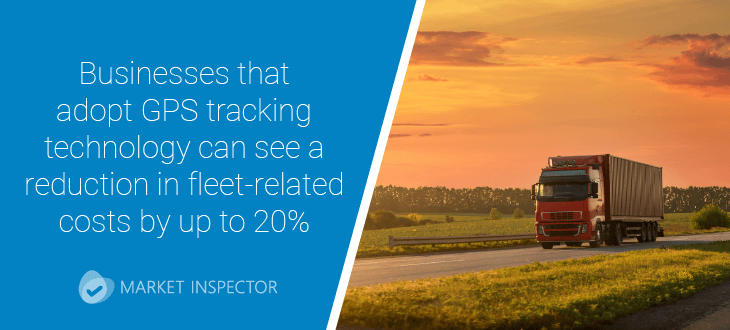Answer these simple questions and we will find you the BEST prices
Which type of solar quotes do you need?
It only takes 30 seconds
100% free with no obligation

Get up to 4 quotes from our selected suppliers by filling in only 1 form

Save money by comparing quotes and choosing the most competitive offer

Our service is 100% free and with no obligation
- Market-Inspector.co.uk
- Vehicle Tracking
- Wireless GPS trackers
Vehicle Tracker: Wireless GPS Trackers for Business


- Businesses that adopt GPS tracking technology can see a reduction in fleet-related costs by up to 20%.
- Wireless GPS trackers offer a modern solution for managing vehicle fleets with precision and ease.
- The integration of wireless GPS tracking systems into fleet management enables business owners to maintain real-time oversight, enhance operational efficiency, and improve security measures.
Wireless GPS trackers offer a dynamic solution for business owners aiming to enhance efficiency and security in their vehicle management.
These devices utilise advanced technology to provide real-time location data, enabling businesses to monitor and optimise their fleet operations effectively.
This guide delves into the workings of wireless GPS car trackers, their benefits, and their potential applications for various business models.
To ensure you select a system that aligns with your needs and budget, we recommend obtaining multiple quotes. Comparing different options helps you find the best solution for optimal performance and cost-effectiveness. Take action now to enhance your fleet management and advance your business.
- Describe your needs
- Get free quotes
- Choose the best offer
It only takes 30 seconds

How do wireless GPS car trackers work?
Wireless car GPS trackers work by employing a combination of satellite signals and cellular technology to pinpoint and track the location of a vehicle. Read on to have a detailed breakdown of the technology behind it.
- GPS satellite signals: The tracker receives signals from a network of about 30 satellites orbiting the Earth, part of the Global Positioning System (GPS). Each satellite transmits signals that include the satellite's location and the exact time the signal was sent.
- Signal reception and triangulation: The GPS device in the vehicle uses the time it takes for these signals to reach it from multiple satellites to calculate the vehicle's exact position. This process is known as triangulation, which requires the signal from at least three satellites to accurately determine a three-dimensional position (latitude, longitude, and altitude).
- Data transmission via cellular networks: Once the location is determined, the tracker uses cellular networks to send this information back to a central server. This can happen in real time or at set intervals, depending on the system's configuration.
- User interface and data utilisation: The location data is then processed and made available to the user through an online platform or a mobile application. This interface allows fleet managers or vehicle owners to view real-time data, historical routes, and various other metrics such as speed, idle time, and more.
The GPS tracker not only helps in locating and tracking but also in managing vehicle usage more efficiently, ensuring better compliance with regulatory requirements and improving overall operational efficiency, this is according to Bobit Fleet Group’s whitepaper on GPS Vehicle Tracking: A Start-Up Guide for Your Business.
Track your vehicles by phone
Wireless GPS tracker devices can be linked to a mobile application, enabling fleet managers to monitor their vehicles directly from their smartphones, this is highlighted in Vimcar Resources’ data.
This integration offers a user-friendly interface to see real-time locations, track vehicle movements, and receive updates. Business owners can set up alerts for specific events such as route deviations, excessive idling, or unauthorised use outside operational hours.
Notifications are sent directly to their mobile devices, ensuring they are always informed of their fleet's status and can respond quickly to any irregularities. The convenience of mobile tracking not only saves time but also allows for greater flexibility in fleet management
Track a vehicle remotely
Geotab’s research on Small Fleet Management discusses the benefits of remote vehicle tracking and the ability to manage fleet operations from anywhere, which is facilitated by modern GPS technology and mobile accessibility.
The capability to track vehicles remotely transforms fleet management by offering control and monitoring from any location with internet access. This feature is particularly useful for businesses that operate across wide geographical areas.
By using GPS trackers, fleet managers can oversee all fleet activities, optimise routes, monitor driver behaviour, and ensure compliance with company policies.
Additionally, remote tracking provides historical data and analytics, which are crucial for making informed decisions about fleet efficiency and cost management. This level of surveillance enhances security as it allows for immediate action in case of theft or misuse of the vehicle.
Benefits of using wireless car trackers

GPS tracking technology can be leveraged by business owners to enhance fleet management, improve safety and compliance, and manage costs more effectively.
Enhanced efficiency and productivity
Wireless car trackers offer tremendous benefits in terms of increasing the operational efficiency of your fleet.
By providing precise tracking information, these devices enable fleet managers to optimise routes and reduce idle times. This can lead to significant savings on fuel and maintenance costs.
“By integrating advanced telematics systems into our fleet, we’ve been able to enhance the productivity of our operations and reduce overhead costs significantly,” highlights a white paper from Mix Telematics, titled Enhancing Driver Performance Through Advanced Telematics Solutions.
Improved safety and compliance
Another significant benefit of using wireless car trackers is the improvement in safety and compliance with transport regulations. The trackers can monitor driving behaviour, such as speeding, harsh braking, and sharp turns, allowing fleet managers to implement better safety protocols and training programs.
“The use of GPS tracking has been instrumental in improving our compliance with safety regulations and reducing the incidence of driving-related incidents,” according to a report from MiX by Power Fleet, titled Help Your Fleet Drive Safely in Adverse Weather Conditions.
Cost management
GPS tracking systems help in better managing the costs associated with fleet operations. This includes not just fuel consumption but also other variable costs such as wear and tear on vehicles and labour costs.
“Our analysis shows that businesses that adopt GPS tracking technology can see a reduction in fleet-related costs by up to 20%,” states a report titled Fleet Management Markets by Mordor Intelligence, a research company.
Monitor vehicle performance
Monitoring vehicle performance through wireless GPS trackers offers a comprehensive way for UK business owners to enhance fleet management, improve maintenance scheduling, and observe driver behaviour more closely. Here is how these systems contribute to these aspects.
Track maintenance schedules
A wireless car tracker provides timely data on vehicle health, which can be crucial for scheduling maintenance. By keeping track of mileage and engine hours, these systems help ensure that vehicles are serviced at the appropriate times, preventing breakdowns and costly repairs.
This proactive approach to maintenance not only extends the lifespan of vehicles but also ensures they operate at peak efficiency.
“Regular maintenance updates and alerts from our GPS system have dramatically reduced vehicle downtime and improved our fleet’s overall reliability,” as mentioned in Verizon Connect’s resources on fleet management, titled 2024 Buyers Guide: Fleet Management Software.
Monitoring driver behaviour
Analysing driver behaviour is another key benefit of GPS trackers. These systems record data on driving patterns, such as speed, braking habits, and acceleration. Fleet managers can use this information to identify risky driving behaviours and provide targeted training to improve safety and reduce the risk of accidents.
“Implementing GPS tracking has enabled us to enhance driver safety and reduce incident rates by focusing on real-time behaviour modification,” according to Mix Telematics’ white paper on improving driver behaviour and safety, titled In-Cab Video Monitoring for Improving Driver Behavior and Safety.
These functionalities of GPS trackers are crucial for UK business owners looking to maintain high standards of fleet operation, ensuring that vehicles are not only well-maintained but are also operated safely and efficiently.
Better route planning
Implementing wireless GPS trackers allows business owners to optimise route planning, which can significantly reduce fuel consumption and minimise delays.
With accurate and up-to-date traffic data, these systems enable drivers to avoid congested routes and roadworks, thereby improving overall time management and customer satisfaction.
“Optimised route planning through GPS tracking has not only reduced our fuel costs but also enhanced our service delivery by ensuring timely arrivals,” as discussed in a Geotab whitepaper. This approach to fleet management helps in achieving better planning and operational efficiency.
Better vehicle security
Wireless GPS trackers also play a crucial role in improving vehicle security. By enabling real-time monitoring, these devices help prevent theft and unauthorised use of vehicles.
Business owners can set up instant alerts to be notified whenever a vehicle moves out of a designated area or is used outside of approved hours.
“The security features inherent in our GPS systems have significantly decreased incidents of vehicle theft and unauthorised usage,” highlighted by Verizon Connect’s research on How to Fight Theft and Unauthorised Use.
This layer of security is essential for protecting assets and reducing potential financial losses due to theft or misuse.
These enhanced capabilities of wireless GPS trackers are invaluable for business owners, helping to streamline operations, reduce operational costs, and secure fleet assets effectively.
Does your business need a wireless GPS vehicle tracker system?

For businesses such as consumer delivery services, wireless GPS trackers are invaluable. They allow real-time tracking of delivery vehicles, enabling the business to provide customers with accurate estimated times of arrival.
This feature enhances customer service by allowing businesses to notify customers promptly if delays occur, thus improving the overall customer experience.
For example, the whitepaper research from Bobit Fleet Group emphasises that "Using GPS tracking, our delivery service has been able to reduce wait times and increase customer satisfaction by providing precise arrival times." This approach is vital for maintaining competitiveness and ensuring customer satisfaction.
These features make GPS vehicle trackers an essential tool for companies within the service industry.
Fleet management companies
According to the Arval Mobility Observatory's Fleet & Mobility Barometer, fleet management companies, including those involved in delivery services and ride-sharing like Uber, can significantly benefit from wireless GPS trackers.
These tools help manage and optimise fleet operations by enhancing route planning, improving safety, and reducing operational costs.
The report also highlights the importance of GPS tracking in supporting the transition to electric vehicles, which is crucial for companies looking to reduce environmental impact and fuel expenses.
As the report suggests, the integration of telematics proves vital for improving Total Cost of Ownership (TCO) and fleet efficiency.
Effective fleet management through GPS tracking can significantly enhance service responsiveness and operational throughput. This is according to the Fleet and Mobility Barometer conducted by Arval Mobility Observatory, an industry expert in the recording and forecasting of mobility trends.
Also, wireless GPS trackers are essential for dynamic routing and dispatch. This is beneficial for services that require scheduling and routing based on customer needs, such as emergency services, delivery companies, and utility services.
GPS trackers also seamlessly accommodate truck tracking within your fleet. This integration ensures comprehensive insights that help streamline operations and enhance overall fleet performance across various vehicle types.
Car rental companies
Car rental companies can greatly benefit from integrating wireless GPS trackers into their fleets, as highlighted by the insights from an industry survey, conducted by fleet management software provider, Vimcar.
Wireless GPS trackers for cars are essential for efficient fleet management. Often referred to as vehicle trackers or GPS car trackers, these wireless car tracking devices help monitor and secure fleets.
While car tracking costs vary by system complexity, the investment in a GPS tracker for cars generally leads to significant operational savings and improved service reliability.
Considering this, with a car tracker fitted to your vehicles, you can monitor their locations in real-time and optimise routes.
The use of GPS tracking systems in car rentals can enhance vehicle security, reduce the risk of theft, and provide real-time data on vehicle usage. This technology ensures vehicles are used appropriately and efficiently, helps in monitoring vehicle conditions, and improves customer service by providing accurate vehicle availability and location information.
Implementing GPS trackers helps in managing fleet operations more effectively, leading to cost savings and improved service reliability. It also improves asset management by ensuring that rental vehicles are used within the agreed terms and helps in quickly locating and recovering vehicles that are not returned on time.
This is crucial for minimising revenue loss and maintaining inventory accuracy, the survey highlights.
Public transportation companies
For public transport vehicles like buses and trains, maintaining strict schedules and optimal routes is essential for passenger satisfaction and operational reliability.
According to the Transport Statistics Great Britain national statistics report, conducted by the UK Department of Transport. These public transportation companies can significantly benefit from integrating wireless GPS trackers.
These systems provide precise real-time vehicle tracking, essential for enhancing operational efficiency and ensuring adherence to schedules, which directly improves passenger satisfaction.
Additionally, GPS tracking can assist in optimising routes and schedules based on detailed travel data, helping to minimise delays and reduce operational costs like fuel consumption.
Enhanced safety is another crucial benefit, as these systems allow for the monitoring of vehicle speeds and driver behaviour, ensuring compliance with traffic regulations and improving overall service reliability.
In emergencies, the ability to pinpoint vehicle locations instantly enhances response times and coordination. Overall, the adoption of GPS technology in public transport can lead to improved service quality and increased passenger trust.
Get multiple quotes on wireless GPS trackers
In today's competitive market, choosing the right tools is crucial for optimising your operations. When it comes to managing your fleet, the benefits of wireless GPS devices are undeniable - from real-time tracking to improving route efficiency and reducing costs.
But with so many options available, it's essential to ensure you're getting the best system for your specific needs at the best price.
Compare different wireless GPS tracking solutions. By gathering multiple quotes, you can compare features, the cost of trackers, support services, and system compatibility directly tailored to your fleet size and industry requirements.
Get quotes from leading providers and discover the perfect solution that fits your business needs.
- Describe your needs
- Get free quotes
- Choose the best offer
It only takes 30 seconds

FAQ
All businesses involved in fleet management, delivery services, and public transportation can benefit from real-time GPS tracking, enabling them to manage their operations more effectively and safely.
Yes, many GPS tracking systems offer mobile apps that provide real-time tracking information directly on smartphones, facilitating convenient and accessible vehicle monitoring.
Yes you can, the modern GPS tracking technology allows for remote monitoring of vehicles, which is crucial for businesses that need to maintain tight control over their fleets at all times.

Nicole Bea Kerr is a content writer for Market Inspector, leveraging her experience in B2B journalism and editing. She is interested in bringing more awareness to sustainability and helping businesses make informed choices through insightful narratives.
We strive to connect our customers with the right product and supplier. Would you like to be part of Market Inspector?

